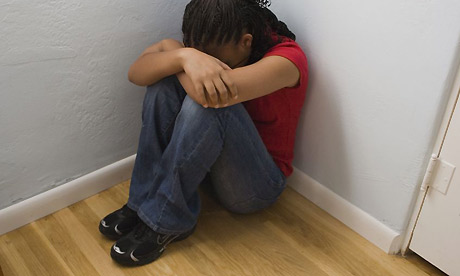 The past month has been a busy one for the juvenile justice system in the United States. CNN reported that teen offenders in Missouri are "finding a future" through a juvenile justice program that focuses on therapy and education, while the New York Times reported that mentally ill juveniles are straining the system. In either case, it's a good sign that people are talking about the juvenile justice system, which is far from perfect -- and in some cases, far from functional.
The past month has been a busy one for the juvenile justice system in the United States. CNN reported that teen offenders in Missouri are "finding a future" through a juvenile justice program that focuses on therapy and education, while the New York Times reported that mentally ill juveniles are straining the system. In either case, it's a good sign that people are talking about the juvenile justice system, which is far from perfect -- and in some cases, far from functional.In Missouri, teen offenders are housed in dormitory-like buildings that provide colorful, comfortable accommodations. Teens go through therapy and are given the opportunity to go to school and receive job training. Juvenile offenders are also assigned case workers and work closely in small groups, learning about self-control, teamwork, and other skills necessary to become productive members of society. Even violent offenders are given the chance to work toward rehabilitation in small groups, though they live in gated facilities.

While the federal rates of suicide and recidivism in youth offenders remain relatively high, officials in Missouri note that no juvenile offenders have committed suicide while in the program (which began in the 1970s) and only about 9 percent of juveniles in Missouri are back in trouble within three years of release. The low rate of recidivism, in turn, saves the state's justice system billions of dollars by lowering the number of repeat offenders and cutting down on the costs of building and maintaining more prisons.
Many of the young people who go through the Missouri system eventually go on to college and become productive members of their communities. CNN reported that one girl, who was incarcerated in 2005 for alcohol abuse and behavioral problems, said that she had always wanted to go to college, but didn't think it could actually happen. This year, she's graduating from college and applying to law school.
More states should follow the Missouri model for juvenile offenders, ensuring that youth get the attention and education they need to become productive members of society. It is a stark contrast with the Ohio system mentioned in the New York Times article. The system in question houses a juvenile population that includes many teens with mental illness. Nationwide, nearly two-thirds of juvenile inmates are dealing with psychiatric disorders. Housing juveniles with mental illness in correctional facilities fails to address the issue at hand, which is getting the youth access to medication, therapy, and other tools that will allow them to manage their illnesses and work their way toward becoming reintegrating into their communities.
 The article in the New York Times also reports that juvenile correctional facilities are the usually the only option for teenagers who deal with serious mental illness and criminal records. Once they arrive, teenagers are usually kept on strong psychotropic drugs and receive limited access to therapists and behavior modification programs. The article also mentions that in 2001 over 9,000 families relinquished custody of their mentally ill children to the juvenile justice system so that the youth could get access to mental health services.
The article in the New York Times also reports that juvenile correctional facilities are the usually the only option for teenagers who deal with serious mental illness and criminal records. Once they arrive, teenagers are usually kept on strong psychotropic drugs and receive limited access to therapists and behavior modification programs. The article also mentions that in 2001 over 9,000 families relinquished custody of their mentally ill children to the juvenile justice system so that the youth could get access to mental health services.It is irresponsible not to allow children and teenagers access to the appropriate resources in any case, but it ought to be criminal to ignore the needs of the mentally ill. If we don't allow mentally ill teenagers some control over their bodies and minds through medication and therapy, how do we expect them to navigate the world in a safe and appropriate way? What do we expect mentally ill teenagers to learn in correctional facilities? By simply locking them up and throwing away the proverbial key, we're only teaching them that no one is looking out for their best interests, so they'll have to fend for themselves.
My hope is that more states will begin to follow the Missouri model. It's appropriate, intelligent, and ultimately better for society if we prepare juvenile offenders for a life outside prison walls. Prepared teens are functional teens, and functional teens become functional adults who stay out of the prison system. The investment with teenagers up front will pay for itself a dozen times over in the end; we just need to be willing to make the investment now to reap the rewards in the future.
1 comment:
Danielle,
Thank you for covering this important issue!
There is pending legislation in Congress right now to promote the Missouri reform model, the Juvenile Justice & Delinquency Prevention Act (S. 678).
Please encourage your readers to urge Congress to not go "home for the holidays" without passing juvenile justice reform!
Click here to contact Congress at: http://criminaljustice.change.org/actions/view/support_juvenile_justice_reform.
Thanks!
Liz Ryan
Campaign for Youth Justice
www.campaignforyouthjustice.org
Post a Comment